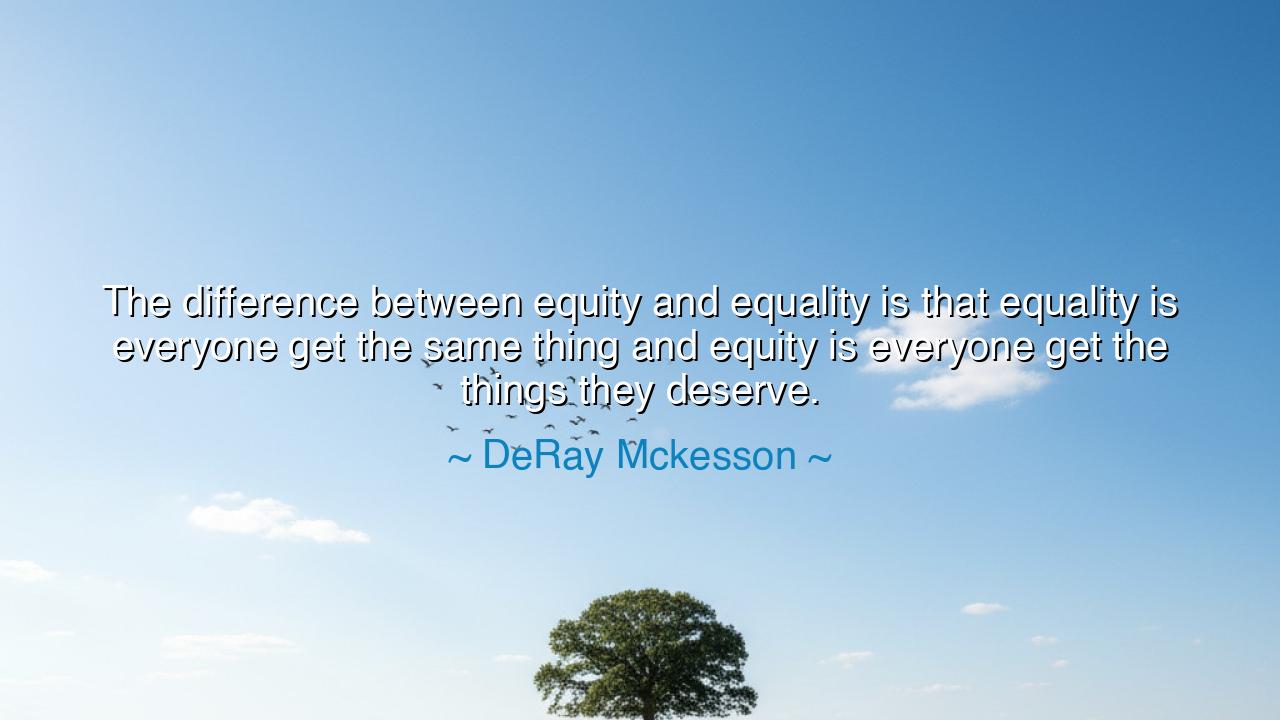
The difference between equity and equality is that equality is
The difference between equity and equality is that equality is everyone get the same thing and equity is everyone get the things they deserve.






“The difference between equity and equality is that equality is everyone get the same thing and equity is everyone get the things they deserve.” Thus spoke DeRay Mckesson, activist and teacher, whose voice rose from the struggles for justice in the modern age. His words, though plain, are charged with ancient wisdom, for they reveal the distinction between what is fair in appearance and what is fair in truth. To give all men the same cloak in winter is equality; to give the thickest cloak to the one shivering most in the cold is equity. One looks upon sameness, the other upon justice.
The ancients knew this difference though they used other words. Aristotle, when he wrote of justice, distinguished between distributive justice and corrective justice. He taught that treating all men alike without regard to their circumstance was not always just, for justice must be proportionate. In this same spirit, Mckesson declares that equality may still leave many in need, while equity seeks to meet each according to their condition. Thus he calls us beyond the surface of fairness, to its deeper heart.
History, too, gives us lessons of this truth. Consider the Reconstruction era in America after the Civil War. Freed slaves were given equality in law through emancipation and amendments, but they were not given equity—land, resources, or protection that would allow them to build lives on equal footing with those who had enslaved them. The same opportunity, offered to both, favored the powerful and left the oppressed still struggling. This is the tragedy Mckesson names: sameness without justice is an empty promise.
Or reflect on the G.I. Bill after the Second World War. It promised equality, granting veterans access to education and housing loans. Yet in practice, discriminatory systems ensured that white veterans reaped full benefit while Black veterans were often denied. Equality was written, but equity was absent. Thus whole communities were elevated while others were held down. This history shows how the difference between the two is not a matter of theory, but of life and death, poverty and prosperity, despair and hope.
Mckesson’s words also challenge the comfortable. For equality is often easy—it asks only that we treat everyone the same, regardless of their starting point. Equity is harder; it demands we look deeply, acknowledge historical wounds, and act to restore balance. To pursue equity is to admit that some have carried heavier burdens, and justice requires more than identical treatment—it requires repair, redress, and restoration. This is why his teaching carries weight: it pierces the illusion of fairness and calls for true justice.
The lesson for us is clear: if we would be just, we must not be content with equality alone. We must strive for equity, ensuring that each person receives not simply the same, but what they need to live fully, to flourish, to stand shoulder to shoulder with others in dignity. This means asking not, “Have I given the same to all?” but rather, “Have I given to each what is truly due?” It is a harder path, but it is the path of righteousness.
Practical wisdom follows: in your own life, practice this distinction. With your children, your colleagues, your community—do not merely divide equally, but give according to need. Support those who carry greater weights. Use your strength to lift the weary, not merely to keep pace with the strong. And in your judgment of society, measure laws and policies not by whether they promise equality, but whether they deliver equity.
Thus DeRay Mckesson’s words, born of struggle yet glowing with timeless truth, remind us that sameness is not enough. Equality may comfort the powerful, but only equity heals the broken, uplifts the oppressed, and creates a society where justice truly dwells. Let us, then, not settle for the shadow, but seek the substance—where every person receives not simply the same, but what they rightfully deserve. In this lies the true path of justice.






AAdministratorAdministrator
Welcome, honored guests. Please leave a comment, we will respond soon